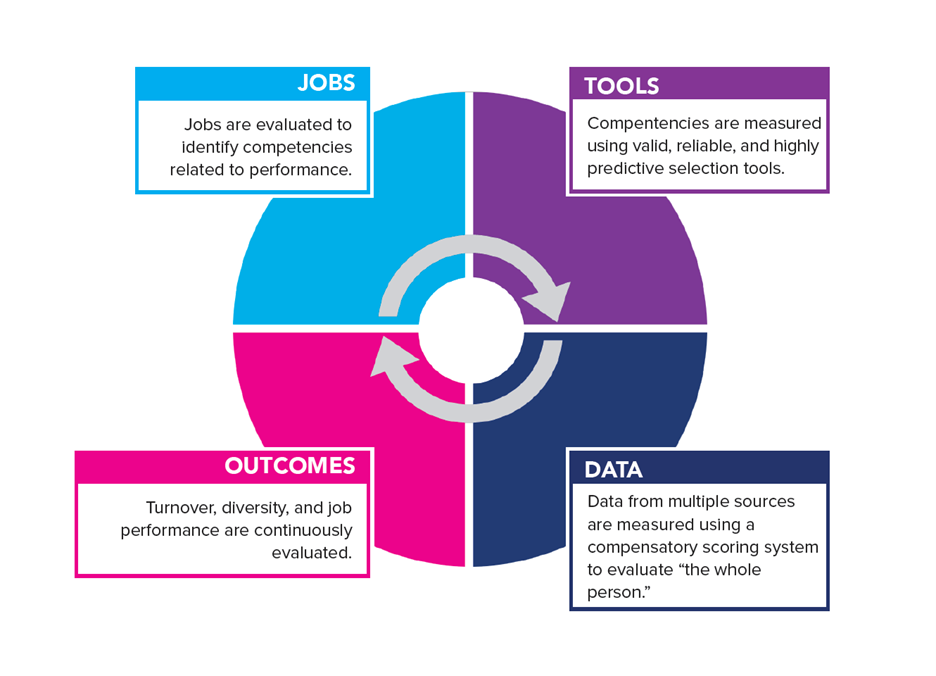Many organizations in West Michigan and beyond desire to increase workforce diversity and inclusion. To reach this goal, one strategy proven to lead to positive outcomes is skills-based hiring.

Skills-Based Hiring – Why employers should use it
In skills-based hiring, organizations identify the skills required to perform a job and select candidates based on their demonstration of these skills. This methodology differs from traditional approaches to candidate selection where organizations screen candidates primarily based on educational attainment and relevant work experience. Additionally, in traditional selection processes decisions are made primarily based on resume reviews and interviews, leaving selection decisions open to bias and noise. Although organizations employing skills-based hiring may still require some education and/or experience for jobs, their primarily focus is on the candidate’s foundational and occupational competencies as measured through tools such as credentials and certifications, skills assessments, skills demonstrations and assessments of past behavior.
According to research, by focusing on effective, relevant, and accurate measurements of candidate’s actual skills, organizations are able to reduce barriers and bias in selection and promotion processes. Education and experience requirements can act as barriers to employer’s goal of improving diversity by limiting the qualified candidate pool.
Consider this –
- Between 2006 and 2017, 74% of all job postings were jobs where employers typically require a college degree, leaving just 26% of jobs open for the 60% of the workforce without a college degree.
- Screening by college degree hits minorities particularly hard, eliminating 76 percent of Black adults and 83 percent of Latino adults.
Local Leading Practice: Evidence-Based Selection
One framework for adopting skills-based hiring is Evidence-Based Selection (EBS) which is a fair, objective, data-driven strategy designed to help organizations make better hiring decisions. EBS incorporates the principles of industrial and organizational psychology — the study of human behavior in organizations and the workplace — to support a consistent, structured, and standard selection process. EBS includes the identification of competencies important to job performance, use of best practice tools in assessing these competencies, and the use of a structured, informed process for comparing candidate competency data to job requirements. EBS was first developed at Mercy Health West Michigan in 2010.
Evidence-Based Selection Framework

What is HireReach?
One-way employers are tackling the challenge of increasing diversity is by participating in HireReach, a program that helps organizations implement a skills-based model for hiring and promotion. Through HireReach, organizations participate in an Academy which combines online learning, tools and resources, interactions with peer organizations and customized consulting. Academy sessions run for 5 months and are followed by 6-12 months of customized consulting supports based on organizational needs. HireReach Program Manager, Marlene Brostrom states, “Changing the way you hire and promote people is a big change for most organizations. Many organizations we work with have the desire to move to a skills-based hiring model, but aren’t sure how to get started. Others have tried before and gotten lost in the sea of tools and consultants promising to solve all of their talent problems. At HireReach our goal is to provide everything an organization needs to transition to using Evidence-Based Selection. And it’s working! Many of our participating employers have reported being better equipped to manage the challenging talent market due to their adoption of an evidence-based selection model.” Since its inception in 2019, over 30 organizations have participated in HireReach to transition to a skills-based hiring model.
Employer Feedback on HireReach
“The most valuable part of participating in HireReach was learning about the data behind evidence-based selection. This is an innovation that can transform your hiring process. It was incredibly valuable to have a team of experts help us update a hiring process to be consistent, equitable, and legally defensible.” City of Grand Rapids.
“We appreciated the intellectual and practical introduction to tools and techniques to reduce hiring bias. We also valued the partnership with other employers in our cohort, along with the guidance we received from the HireReach team. This has been incredibly helpful as we navigate implementing what we learned.”
They gave us a method to improve quality and metrics in the critical areas of recruiting and hiring. The process helped us remove barriers and broadened our reach to further diversify our faculty and staff.” Davenport University
Closing
Watch for more news about HireReach including information about our next Academy. For more information follow HireReach on LinkedIn or visit their website at hirereach.org.
{{cta(‘be643ac7-73e2-40f6-a7b2-7c5927924bf4′,’justifycenter’)}}


